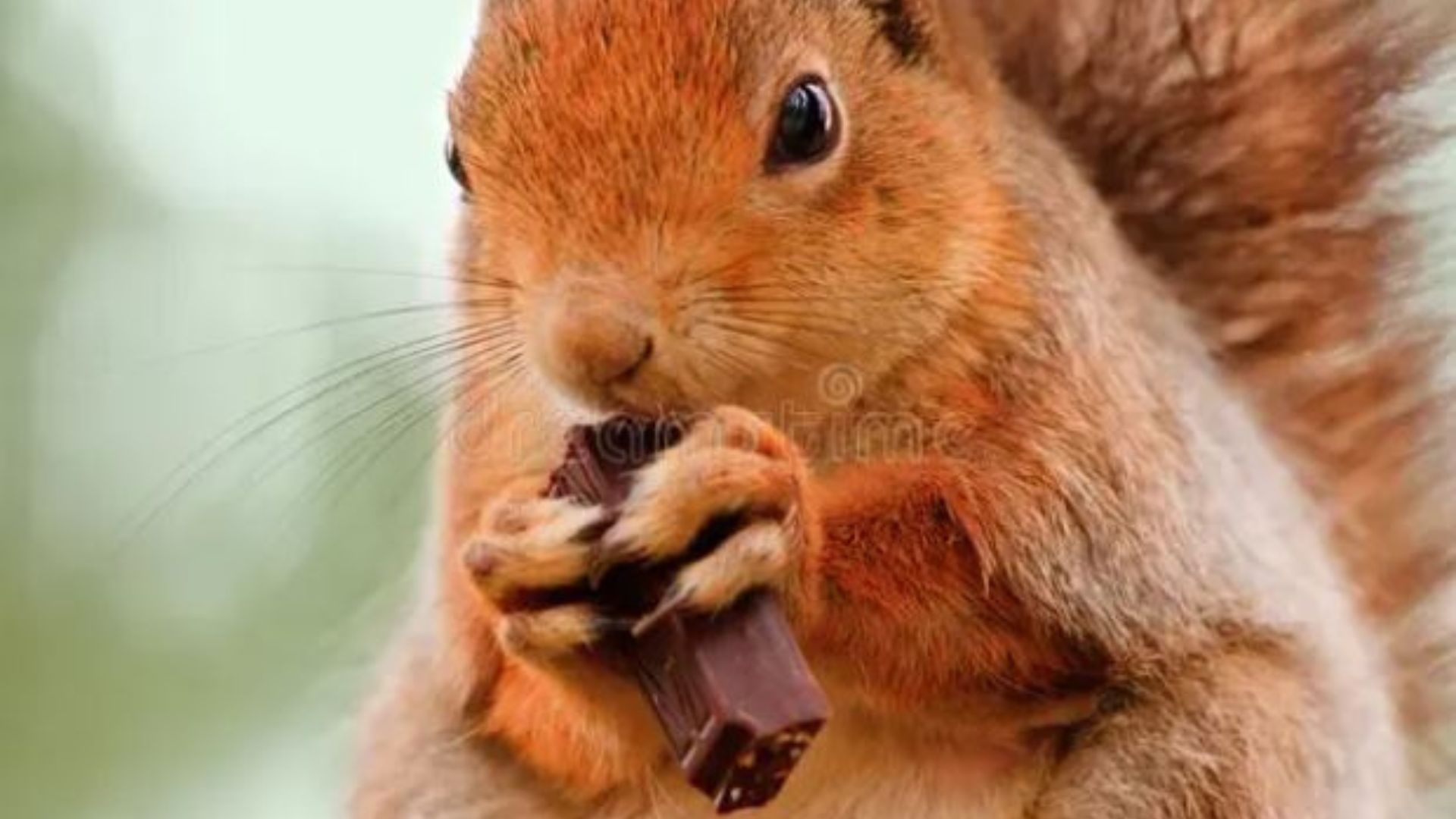Can Squirrels Eat Chocolate? The Surprising Risks of Cocoa to Wildlife
The Toxic Truth: Here's Why You Should Never Feed Chocolate to Squirrels

It was a crisp autumn day when I looked out my window and noticed a squirrel scurrying across the yard…
Suddenly, it stopped and examined a small, shiny wrapper on the ground…
To my surprise…
… the squirrel picked up the wrapper, revealed a half-eaten chocolate bar, and eagerly devoured the rest in a few quick bites.
It made me wonder… can squirrels eat chocolate?
I later learned that while chocolate may smell tempting to squirrels, it can actually be extremely toxic and dangerous for them to eat.
Squirrels have very strong senses of smell and will try eating anything that smells appealing, including chocolate.
However, chocolate contains ingredients like theobromine and caffeine that can be poisonous to squirrels. Even small amounts of chocolate can make squirrels seriously ill.
So, can squirrels physically eat chocolate? What drives them to eat it? And is chocolate truly toxic to squirrels? Here is what you need to know.
Read More: Can Ducks Eat Grapes?
Can Squirrels Eat Chocolate?

Squirrels have the ability to chew and swallow chocolate without much difficulty.
Their sharp teeth can bite through the hard outer shells of nuts and seeds, so a chocolate bar or candy coating poses no challenge.
Squirrels also appear to tolerate the sweet taste of chocolate.
With jaws that never stop growing, squirrels are rodents genetically adapted for gnawing, cracking, and chewing all kinds of foods.
So, there is nothing stopping them from breaking off and eating pieces of chocolate if they find them.
Why Do Squirrels Eat Chocolate?
A squirrel’s strong sense of smell leads them to explore and consume anything that smells good, including chocolate.
Chocolate has a distinct sweet, cocoa aroma that can attract and tempt squirrels. They don’t understand that it may be harmful.
Squirrels are opportunistic eaters that will sample almost any available human food, even toxic ones. They are curious and impulsive, which motivates them to eat chocolate.
Is Chocolate Toxic to Squirrels?
Yes, chocolate can absolutely be toxic and lethal for squirrels to eat. Here’s why:
- Dark chocolate is more dangerous than milk chocolate. It contains higher levels of toxic theobromine and caffeine.
- Even small 1–2-ounce amounts of chocolate can cause heart attacks, seizures, or death in squirrels. The ASPCA confirms chocolate ingestion is dangerous for them.
- Theobromine and caffeine affect squirrels far more severely than humans. We metabolize them more efficiently while squirrels are highly sensitive.
According to the National Confectioners Association, chocolate companies currently provide no warnings about the dangers of chocolate ingestion for wild animals like squirrels.
However, they are monitoring this issue and are willing to consider adding warning labels if wildlife poisoning incidents increase. For now, public education is key to keeping squirrels safe from chocolate temptation.
Specific Dangers of Chocolate for Squirrels
- Theobromine poisoning – Theobromine is toxic to squirrels and causes heart failure, internal bleeding, seizures, and convulsions. Even small amounts can be deadly.
- Caffeine overdose – Caffeine acts as a stimulant at high levels, leading to hyperactivity, cardiac stress, muscle tremors, and potentially heart attacks in squirrels.
- Weight gain and diabetes – Chocolate is high in fat and sugar. Eating it regularly can cause obesity, dental issues, and blood sugar problems.
- Tooth decay – Sticky, sugar-laden chocolate can get stuck in squirrels’ teeth, promoting cavities, gum disease, and infection.
- Dehydration – Chocolate contains caffeine which increases urination. This fluid loss can rapidly dehydrate small squirrels.
Amount of Chocolate that is Toxic
- Only 1-2 ounces of milk chocolate can be lethal for an average gray squirrel.
- Even smaller amounts of dark chocolate with more cocoa can potentially be fatal.
- There is no definitive “safe” dosage, as poisoning depends on the animal’s size and sensitivity.
Signs of Chocolate Poisoning in Squirrels
- Vomiting, diarrhea, increased thirst and urination
- Hyperactivity, tremors, seizures
- Rapid breathing and elevated heartbeat
- Disorientation, loss of coordination, stumbling movements
- Collapse, coma, and death
In a survey, the symptoms most commonly seen in animals sick from chocolate were hyperactivity, vomiting, diarrhea, and seizures.
Dehydration from fluid loss was also a major concern. Rehabilitators recommended immediately contacting a vet if any of these signs are observed after a squirrel ingests chocolate.
What to Do if a Squirrel Eats Chocolate
- Remove any remaining chocolate to prevent further ingestion. Also, collect any wrappers or packaging to identify the chocolate type.
- Contact a wildlife rehabilitator or veterinarian immediately. Timing is critical to get ahead of poisoning effects.
- Try to keep the squirrel hydrated by providing fresh water while waiting for help. Use a dropper if needed.
- Contain the squirrel in a secure, quiet space but avoid excessive handling. Limit stress.
- Keep the squirrel in a warm area to prevent hypothermia. Small animals can lose body heat rapidly.
Preventing Squirrels from Eating Chocolate
- Store chocolate safely out of reach, such as in squirrel-proof containers, locked cabinets, or sealed bags. Never leave chocolate unattended outdoors.
- Clean up any crumbs or traces of chocolate right away after outdoor activities like picnics or cookouts. Don’t teach squirrels to associate the area with treats.
- Avoid obvious disposal methods like trash cans or compost bins which squirrels can easily access.
- Use secure odor-blocking bags and containers to prevent attracting squirrels with lingering chocolate smells.
Safe Alternatives to Feeding Squirrels Chocolate
- Tree nuts like almonds, walnuts, and pecans – Natural, healthy treats squirrels love
- Seeds such as sunflower and pumpkin are great sources of protein and fat
- Fruits like apples, bananas, and berries – Provide vitamins, minerals, and hydration
- Vegetables such as broccoli, lettuce, and carrots are nutritious and low-calorie options
- Whole grain breads, crackers – Safer starch-based foods than chocolate
- Plain popcorn or puffed rice cereal – Low-sugar snack alternatives
Statistics show chocolate poisoning is 2-3 times more prevalent in domestic dogs than wild squirrels. However, squirrels are still significantly impacted.
Due to their small size, squirrels cannot tolerate even minute amounts of theobromine or caffeine. Always keep chocolate safely away from wildlife.
